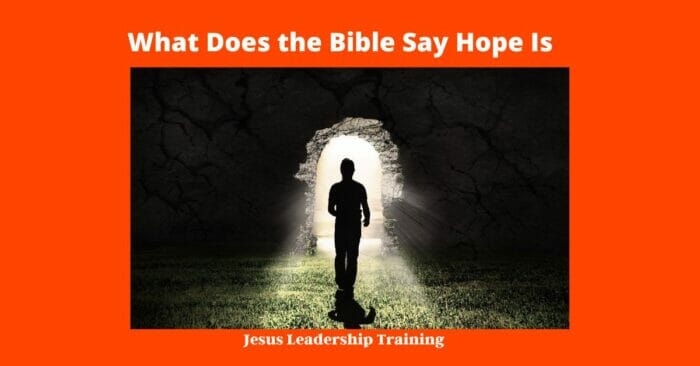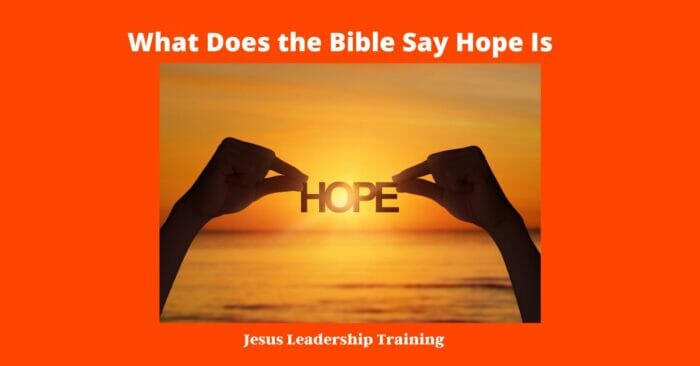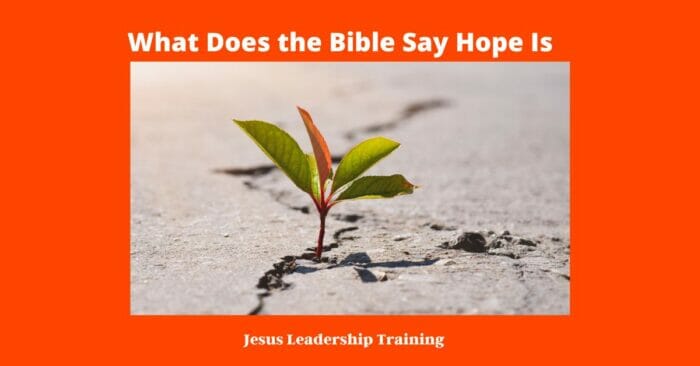What Does the Bible Say Hope Is – The Bible is full of promises of hope, offering comfort and strength in times of struggle and despair. In the book of Romans, Paul encourages believers to persevere in hope, saying, “For in hope we have been saved, but hope that is seen is not hope; for why does one also hope for what he sees?” (Romans 8:24). This verse is a reminder that our hope is in something unseen, something greater than ourselves.
The Bible speaks of hope as an anchor for our souls, something that keeps us grounded in God’s promises and plans. The Bible tells us that hope is more than a wishful thought or a pleasant feeling. Rather, it is a trust in God’s faithfulness and goodness, and a confidence that He will fulfill His promises. In the book of Hebrews, we are reminded that “we have this hope as an anchor for the soul, firm and secure” (Hebrews 6:19).
The Bible also tells us that hope is a source of strength and joy, even in the darkest of times. In Jeremiah 29:11, God says, “For I know the plans that I have for you,’ declares the Lord, ‘plans for welfare and not for calamity to give you a future and a hope.” This passage is a reminder that God’s plans for us are filled with hope, no matter how difficult our circumstances may be.
Table of Contents
What Does the Bible Say Hope Is
Hope is an essential part of the human experience. We can’t help but be hopeful in times of hardship, and we can’t help but feel hopeless in times of joy. We often turn to our faith for answers, and the Bible is a great source of comfort and guidance when it comes to hope. In this blog post, we’ll explore what the Bible says about hope and how it can be used to bring peace and healing to our lives.

The Meaning of Hope According to the Bible
The Bible is filled with references to hope. In the Old Testament, the Hebrew word betach is used to describe hope. This word implies a sense of confidence and trust in God, even in times of sorrow and difficulty. Similarly, in the New Testament, the Greek word elpis is used to describe hope. This word also implies a deep trust in God, even in times of hardship.
Unpacking Hebrew Words for Hope
In Hebrew, the words tikvah, yachal, and bithil are used to describe hope. Tikvah is often associated with faith in God’s promises, while yachal implies a sense of trust in God’s destiny. Bithil is the most active of the three Hebrew words for hope and often refers to a sense of anticipation and expectancy.
- Tikvah (תִּקְוָה) – This Hebrew word translates to “hope” and is often used to refer to a longing for a better future.
- Hitgalut (הִתְגָּלוּת) – This word translates to “revelation” but can also be used to mean “hope” in the sense of a positive outlook.
- Mivchar (מִבְחָר) – This Hebrew word translates to “choice” but can also be used to mean “hope” in the sense of being optimistic about a decision.
- Ratzon (רָצוֹן) – This word translates to “desire” but is also often used to refer to hope in the sense of having a wish for something.
- Rachamim (רַחֲמִים) – This Hebrew word translates to “mercy” but can also be used to mean “hope” in the sense of having compassion or understanding.
- Tov (תּוֹב) – This word translates to “good” but is also often used to refer to hope in the sense of having a positive attitude.
- Me’onah (מְעוּנָה) – This Hebrew word translates to “refuge” but can also be used to mean “hope” in the sense of finding comfort or security.
- Hishtadlut (הִשְׁתַּדְּלוּת) – This word translates to “effort” but is also often used to refer to hope in the sense of striving for something.
- She’elah (שְׁאֵלָה) – This Hebrew word translates to “question” but can also be used to mean “hope” in the sense of inquiring or searching for answers.
- Chiyut (חִיּוּת) – This word translates to “life” but is also often used to refer to hope in the sense of having energy and enthusiasm.

Unpacking Greek Words for Hope
- Elpis (Ελπίς): This is the most widely used word for hope in Greek. It is derived from the verb elpizo, which means “to hope” and carries the connotation of anticipation and expectation.
- Prooptose (Προοπτόσε): This word is slightly more abstract than elpis and can be used to describe an optimistic attitude or outlook towards the future.
- Ora (Ωρα): This word translates to “time” but is also used to describe hope as in “a time of hope” or “a time of expectation.”
- Pistis (Πίστις): This word means “faith” and is used to describe a sense of hope even in difficult times.
- Agape (Αγάπη): This word is used to describe an unconditional love and hope that can be shared between people.
- Spoude (Σπουδή): This word means “effort” and can be used to describe the hard work and dedication that is necessary to achieve one’s hopes and dreams.
- Thelo (Θέλω): This word means “I want” and is used to describe a strong desire for something, which can be interpreted as hope.
- Anamene (Αναμένε): This word translates to “wait” and is used to describe the anticipation and expectation of something that may or may not come.

Unpacking Aramaic Words for Hope
- Bēṯa – This is an Aramaic word for hope, that comes from the root word ‘beth’ meaning “house” and is used to express hope in the sense of being at home or feeling secure.
- Shūm – This word is derived from the root word ‘shum’ meaning “hope” and is used to express hope in a more abstract sense, of wishing for something to happen.
- Ṣabar – This word comes from the root ‘ṣabar’ meaning “wait” and is used to express hope in a more patient sense, of waiting for something to come to pass.
- Ṣawm – This word comes from the root ‘ṣawm’ meaning “hope” and is used to express hope in a more positive sense, of wishing for something to come true.
- Ṣemakh – This word comes from the root ‘ṣemakh’ meaning “wait” and is used to express hope in a more optimistic sense, of believing something will come true.
- Qayyām – This word comes from the root ‘qayyām’ meaning “stand” and is used to express hope in a more determined sense, of standing firm in one’s faith.
- Ṣimḥa – This word comes from the root ‘ṣimḥa’ meaning “happiness” and is used to express hope in a more joyful sense, of looking forward to a bright future.
- Ḥesed – This word comes from the root ‘ḥesed’ meaning “love” and is used to express hope in a more compassionate sense, of hoping for love and kindness to prevail.
What Does the Bible Say About Hope?
The Bible is full of passages that discuss hope. In Romans 15:13, Paul writes, “May the God of hope fill you with all joy and peace as you trust in him, so that you may overflow with hope by the power of the Holy Spirit.” This passage highlights the importance of trusting in God for hope and joy. In addition, Romans 8:24-25 states, “For in this hope we were saved. But hope that is seen is no hope at all. Who hopes for what they already have? But if we hope for what we do not yet have, we wait for it patiently.” This passage emphasizes the importance of having faith in God, even in times of difficulty.
Who Does the Bible Say Can Have Hope?
The Bible is clear that anyone can have hope. In Romans 12:12, Paul writes, “Be joyful in hope, patient in affliction, faithful in prayer.” This passage highlights that hope is available to all, regardless of our circumstances. In addition, Psalm 147:11 states, “The Lord delights in those who fear him, who put their hope in his unfailing love.” This passage emphasizes that hope is available to all who trust in God.
How Can We Find Hope in the Bible?
The Bible is a great source of hope. In 1 Thessalonians 5:8, Paul writes, “Be joyful always; pray continually; give thanks in all circumstances, for this is God’s will for you in Christ Jesus.” This passage encourages us to remain positive and to find joy in our circumstances. In addition, Jeremiah 29:11 states, “For I know the plans I have for you,” declares the Lord, “plans to prosper you and not to harm you, plans to give you hope and a future.” This passage emphasizes God’s desire to give us hope for the future.
7 Steps How Does the Bible Say we can acquire Hope
- Read the Bible: The Bible is a source of hope and encouragement. Reading it regularly will help you to find hope in your life. The Bible provides stories of faith and hope, as well as real-life examples of how God is with us in our struggles. Reading the Bible can help us to remember that God is with us and that He has a plan for our lives.
- Pray: Prayer is an essential part of finding hope in our lives. Prayer allows us to express our struggles, doubts, and fears to God, and it also allows us to focus on finding hope in the promises of God. Praying regularly can help us to keep our minds focused on trusting in God, no matter what our circumstances may be.
- Spend Time with People of Faith: Spending time with other people of faith can help us to find hope in our lives. We can learn from each other’s experiences and be encouraged by each other’s stories of faith. We can also be reminded of God’s promises and His love for us.
- Seek Counseling: If you are struggling to find hope in your life, seeking counseling can be a great way to get help. Counseling can help us to process our struggles and find hope in the promises of God.
- Spend Time in Nature: Spending time in nature can be a great way to find hope. Nature reminds us of the beauty and power of God, and it can help us to remember that He is always with us.
- Focus on the Good: It can be easy to become overwhelmed by the negative things in our lives, but focusing on the good can help us to find hope. Focusing on the good can help us to remember that there are still good things in our lives, even if we are struggling.
- Spend Time with God: Spending time with God is essential to finding hope in our lives. We can do this by spending time in prayer, reading the Bible, and meditating on the promises of God. When we make time for God, we can find hope in the knowledge that He is with us.
When Does the Bible Say We Should Hope?
The Bible is clear that we should always have hope. In Romans 5:3-5, Paul writes, “We also glory in our sufferings, because we know that suffering produces perseverance; perseverance, character; and character, hope. And hope does not put us to shame, because God’s love has been poured out into our hearts through the Holy Spirit, who has been given to us.” This passage encourages us to remain hopeful even in times of difficulty. In addition, Psalm 33:18-19 states, “But the eyes of the Lord are on those who fear him, on those whose hope is in his unfailing love, to deliver them from death and keep them alive in famine.” This passage emphasizes God’s desire to provide hope and deliverance to those who trust in him.
Hope and Peace: How They are Connected in the Bible
The Bible is clear that hope and peace are closely connected. In Romans 15:13, Paul writes, “May the God of hope fill you with all joy and peace as you trust in him, so that you may overflow with hope by the power of the Holy Spirit.” This passage highlights the connection between hope and peace and encourages us to trust in God for both. In addition, Isaiah 26:3 states, “You will keep in perfect peace those whose minds are steadfast, because they trust in you.” This passage emphasizes the importance of trusting in God for both peace and hope.
Healing and Hope: How the Bible Connects Them
The Bible is clear that healing and hope are closely connected. In Isaiah 53:5, the prophet states, “But he was pierced for our transgressions, he was crushed for our iniquities; the punishment that brought us peace was on him, and by his wounds we are healed.” This passage highlights the connection between healing and hope, and emphasizes the importance of trusting in God for healing and hope. In addition, Jeremiah 29:11 states, “For I know the plans I have for you,” declares the Lord, “plans to prosper you and not to harm you, plans to give you hope and a future.” This passage emphasizes God’s desire to provide us with healing and hope.
The Role of Jesus Christ in Biblical Hope
The Bible is clear that Jesus Christ is an important part of biblical hope. In John 14:1, Jesus states, “Do not let your hearts be troubled. You believe in God; believe also in me.” This passage highlights the importance of trusting in Jesus for hope. In addition, Hebrews 6:19 states, “We have this hope as an anchor for the soul, firm and secure. It enters the inner sanctuary behind the curtain.” This passage emphasizes the importance of trusting in Jesus for hope and security.
Discovering the Role of God in Biblical Hope
The Bible is clear that God is an important part of biblical hope. In Jeremiah 17:7, the prophet states, “But blessed is the one who trusts in the Lord, whose confidence is in him.” This passage emphasizes the importance of trusting in God for hope. In addition, Romans 15:13 states, “May the God of hope fill you with all joy and peace as you trust in him, so that you may overflow with hope by the power of the Holy Spirit.” This passage highlights the importance of trusting in God for hope and joy.
The Power of the Word of God in Biblical Hope
The Bible is filled with references to the power of the Word of God in providing hope. In Psalm 119:114, the psalmist states, “You are my refuge and my shield; I have put my hope in your word.” This passage emphasizes the importance of trusting in the Word of God for hope. In addition, Romans 10:17 states, “Consequently, faith comes from hearing the message, and the message is heard through the word of Christ.” This passage highlights the importance of hearing the Word of God in order to have hope.
Biblical Hope for Families
The Bible is full of passages that discuss the importance of hope for families. In Deuteronomy 6:5-6, Moses states, “Love the Lord your God with all your heart and with all your soul and with all your strength. These commandments that I give you today are to be on your hearts. Impress them on your children. Talk about them when you sit at home and when you walk along the road, when you lie down and when you get up.” This passage emphasizes the importance of instilling hope in our children. In addition, Psalm 127:3-4 states, “Children are a heritage from the Lord, offspring a reward from him. Like arrows in the hands of a warrior are children born in one’s youth.” This passage highlights the importance of raising children with hope.
Biblical Hope: Why We Need It
Biblical hope is essential to our daily lives. In Romans 15:13, Paul writes, “May the God of hope fill you with all joy and peace as you trust in him, so that you may overflow with hope by the power of the Holy Spirit.” This passage emphasizes the importance of having hope in order to find joy and peace. In addition, Psalm 39:7 states, “But now, Lord, what do I look for? My hope is in you.” This passage emphasizes the importance of trusting in God for hope.
Final Thoughts – What Does the Bible Say Hope Is
This blog post explored what the Bible says about hope. We discussed the meaning of hope according to the Bible, unpacked Hebrew words for hope, and explored what the Bible says about who can have hope and how we can find hope in the Bible. We also discussed the connection between hope and peace, healing and hope, and the role of Jesus Christ and God in biblical hope. Finally, we discussed the power of the Word of God in providing hope and the importance of biblical hope for families. Ultimately, the Bible is a great source of hope and comfort in times of hardship and difficulty.



